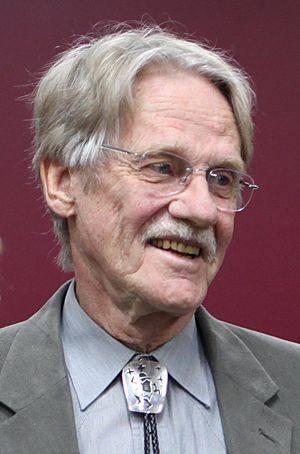Vernon L. Smith facts for kids
Quick facts for kids
Vernon L. Smith
|
|
|---|---|

Smith in January 2011
|
|
| Born |
Vernon Lomax Smith
January 1, 1927 Wichita, Kansas, U.S.
|
| Field | Experimental economics |
| School or tradition |
New classical economics |
| Doctoral advisor |
Wassily Leontief |
| Influences | Friedrich Hayek Richard S. Howey |
| Contributions | Combinatorial auction Experimental economics |
| Awards | Nobel Memorial Prize in Economic Sciences (2002) |
| Information at IDEAS / RePEc | |
Vernon Lomax Smith, born on January 1, 1927, is an American economist. He teaches economics and law at Chapman University. He also taught at other well-known universities like the University of Arizona and George Mason University.
In 2002, he won the Nobel Memorial Prize in Economic Sciences with Daniel Kahneman. He earned this award for his work in experimental economics. This field uses lab experiments to study how people make economic choices. His research helped show that experiments can be a great tool for understanding markets.
Smith founded the International Foundation for Research in Experimental Economics (IFREEE). He is also a member of the National Academy of Sciences. In 2004, he received an honorary degree from the Universidad Francisco Marroquín. A research center there is named after him.
Contents
Early Life and Education
Smith was born in Wichita, Kansas. He went to Wichita North High School and Friends University. His family faced tough times during the Great Depression. Money from his mother's first husband's life insurance helped them survive. This money was invested in a farm, which influenced Smith's later interests.
He earned his bachelor's degree in electrical engineering from Caltech in 1949. He then got a master's degree in economics from the University of Kansas in 1952. Smith completed his Ph.D. in economics at Harvard University in 1955. His Ph.D. paper was about how businesses decide when to replace old equipment.
Academic Career and Research
Smith's first teaching job was at Purdue University from 1955 to 1967. He became a full professor there. He also taught at Stanford University, where he met Sidney Siegel, another experimental economics researcher. Smith later taught at Brown University and the University of Massachusetts Amherst.
Much of the research that led to his Nobel Prize happened at the University of Arizona. He worked there from 1976 to 2001. In 2008, Smith started the Economic Science Institute at Chapman University.
What is Experimental Economics?
Smith started his work in experimental economics at Purdue University. He wanted to help his students understand how markets work. He decided to run a simple market experiment in his class.
He set up a market where students could buy and sell things. He knew the true supply and demand, but the students did not. This allowed him to see how a real market would behave. He ran these experiments over several class periods. This gave students time to learn and adapt.
How Experiments Help Us Understand Markets
Smith helped create the rules for how to do economic experiments. In 1976, he published an important paper called "Experimental Economics: Induced Value Theory." This paper explained the main idea behind economic experiments.
He later expanded on these ideas in another paper. He showed how to use experiments to test how well different market systems work. In these experiments, people are given "costs" to produce something or "values" for consuming it. They then try to make money by buying and selling. This method helps researchers create a mini-market in a lab.
Using these methods, Smith and his team studied different ways people trade. They learned how these different trading methods affect how resources are shared.
Spontaneous Order and Decision Making
Vernon Smith is famous for his ideas about "spontaneous order" in economics. This means that order and structure can appear naturally from what seems like chaos. It happens when people interact without a central plan.
He has taught about this idea in his classes. He shows how social rules and laws can grow naturally from human interactions. They slowly form into organized systems.
More recently, Smith has studied Neuroeconomics. This field combines economic ideas with brain science. It helps us understand how brain activity affects our economic choices. Smith has also pushed for using experiments to teach economics. He believes in a hands-on way of learning.
Personal Life
In 2005, Smith shared that he believed he had Asperger syndrome. He came to this conclusion after looking at his own personality traits.
See also
 In Spanish: Vernon Smith para niños
In Spanish: Vernon Smith para niños
- List of economists
 | Anna J. Cooper |
 | Mary McLeod Bethune |
 | Lillie Mae Bradford |

